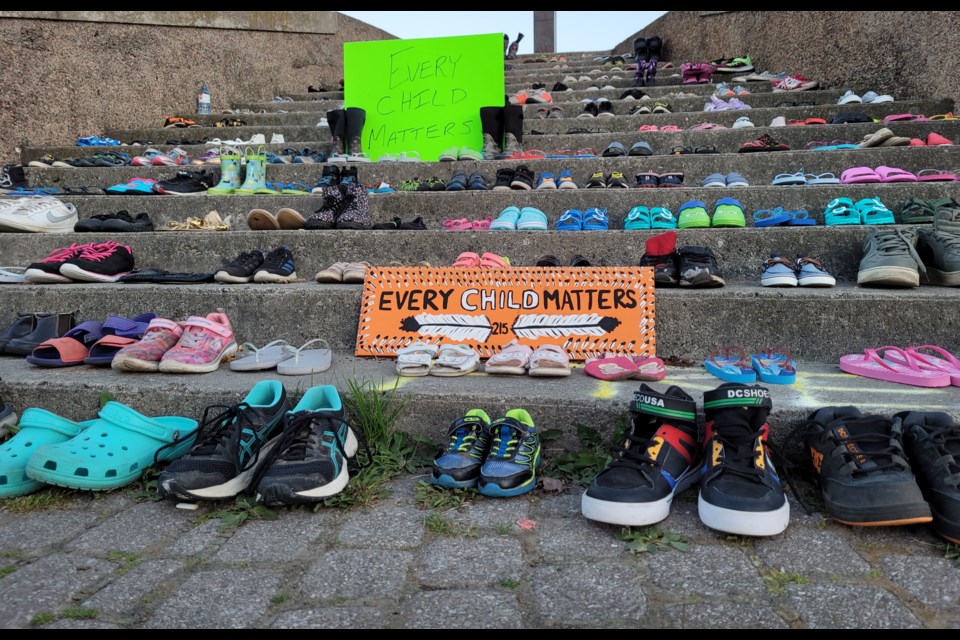While Canada Day 2022 will be fully open from pandemic restrictions as people may be looking to let loose, there are many people in the Indigenous community who are hoping the solemnity of last year wasn’t just "performative."
For the first time since 2019, Canadians will be fully able to celebrate Canada Day as pandemic restrictions are more or less gone.
Last year's restrictions allowed many municipalities, including Barrie, to focus on the tragic discovery of 215 Indigenous children whose bodies were found buried on the grounds of one of Canada’s largest residential schools. That number has grown significantly and more are being found at the former institutions.
Shaneeka Forrester, who is the Indigenous relations co-ordinator for UPlift Black, says that while the deaths were not new to Indigenous people, a mourning period was needed.
“These losses have been known in our communities for generations, but was only then becoming more publicly known,” Forrester says. “It felt like a sense of relief that they are finally being brought to the forefront, like there was a sense of validation for all the stories we were told. I felt that whole process needed and deserved some pause.”
Residential schools were created to take Indigenous children away from their culture and assimilate them into the European-Canadian way of life. For more than a century, it is believed approximately 150,000 children were placed in residential schools across the country.
In 2015, the Truth and Reconciliation Commission (TRC) concluded that Canada’s residential school system amounted to “cultural genocide.”
There are still many people in the country who are mourning and Forrester says she hopes the annual July 1 celebration changes from what it has been in the past.
“I think the foundation of every Canada Day celebration that takes place nationwide needs to have a foundation in Indigenous education, awareness, culture, principles, and needs to amplify Indigenous communities where the celebration is taking place,” Forrester said. “If we’re not centring Indigenous voices while we celebrate Canada Day, then really we are strictly celebrating colonialism, which we do know is harmful to Indigenous communities across Canada.”
As an Indigenous person, Forrester said in order to move forward in the spirit of reconciliation, the country needs to refocus what Canada Day means to everyone as a collective.
“Celebrating being proud of the country you are in and giving gratitude to the privileges that are afforded as Canadian citizens, I don’t think there is anything wrong with that," she said. "It is OK to be proud of those things and to want to celebrate those things.
“But in order for us to celebrate those things we have to acknowledge that it came at the cost of others," Forrester added. "Nobody is saying don’t wave your flag or don’t be proud of where you’re from; we’re simply saying we also need to realize that we have all this because a certain group was oppressed for it to be had.”
The City of Barrie has several events planned for July 1, including live entertainment at Meridian Place, a Canadian wildlife display, games, family activities, and finishing up with fireworks at 10 p.m.
City of Barrie senior communications manager Scott Lamantia said representatives from the local Indigenous community were consulted regarding July 1 programming.
"Their preference was to focus on delivering, supporting and collaborating on cultural programming and learning opportunities for National Indigenous History Month and National Indigenous Peoples Day throughout the month of June," he said.
Forrester said she knows personally some people who didn't feel a need to pause, which she found hurtful and traumatizing.
“It made it feel like there is a dismissal of Indigenous lives and, honestly, we already know there is an undervalue of our lives in Canada," she said. "You need only look at the loss and inaction of murdered and missing Indigenous women and girls, the way we navigate the water crisis in many Indigenous communities, the way our protesters are managed."
Forrester directes people to check out the UPlift Black social media sites for information on how to navigate Canada Day this year. A Guide To Surviving Canada Day On Turtle Island is advice for Indigenous people that pertains to self-care and awareness.
For non-Indigenous people, there is also advice on how to be a strong ally at a time when it may be most needed.
The guide says to include Indigenous voices in a gathering you may have, as well as to educate not just young people and kids but also adults.
There is even simple advice such as reading a book by an Indigenous author, watching an Indigenous film or listening to a podcast by an Indigenous person.
“In this time, particularly, of the controversies surrounding the truck convoys and many people feeling like the flag has been weaponized, it is very triggering to a lot of people,” she said. “I think just being done away with Canada Day in its entirety is unrealistic. So that only leaves the idea of coming together to reduce the harm and finding ways to move forward in a way that people aren’t feeling unseen or unheard.”
Forrester said she does want to see last year’s good intentions continue to where it becomes the norm to make Canada Day an event where all feel included.
“If the day is held in such high regard, people paint their faces red and white, wave flags everywhere they go, it clearly holds a spot dear to people. So use that to elevate the Indigenous communities who feel left out and forgotten. To me, allyship without action is just performative.”



